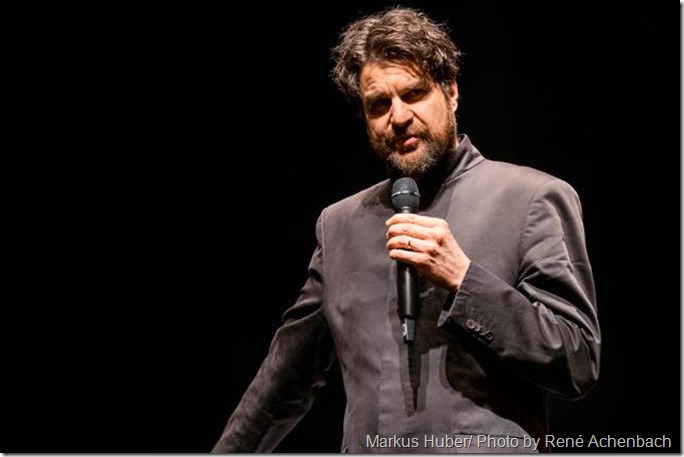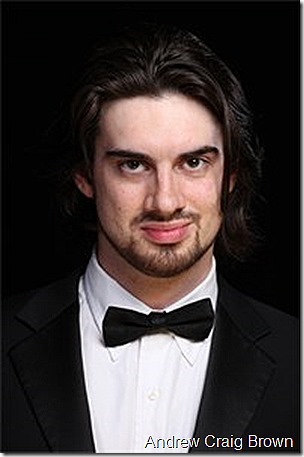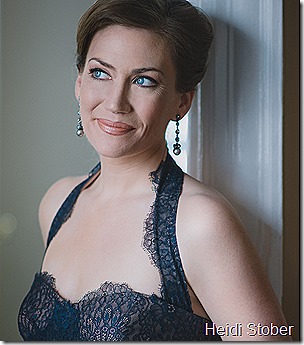
Tucson Symphony Orchestra guest conductor Markus Huber. Photo by René Achenbach.
Note: This has nothing to do with Los Angeles or with history – except perhaps my own history as onetime classical music critic of the Arizona Daily Star. Feel free to ignore it.
No one involved in selecting the Tucson Symphony Orchestra’s 2016-17 season could have realized that Johannes Brahms’ “A German Requiem” and Arnold Schoenberg’s “A Survivor From Warsaw” would be performed on the inauguration day of President Donald J. Trump and certainly no one anticipated its underlying political commentary. It’s quite likely that even Friday night’s audience at the Tucson Community Center Music Hall (and evidently the local press) did not fully appreciate the concert’s political overtones.
 Whoever programmed these pieces must be congratulated on taking a fresh approach for inserting Schoenberg’s 1947 work in the middle of the Brahms “Requiem,” which was premiered in 1869. Addressing the audience from the stage before the concert, German-born guest conductor Markus Huber explained the mash-up of Brahms and Schoenberg by saying that it was intended to shock listeners.
Whoever programmed these pieces must be congratulated on taking a fresh approach for inserting Schoenberg’s 1947 work in the middle of the Brahms “Requiem,” which was premiered in 1869. Addressing the audience from the stage before the concert, German-born guest conductor Markus Huber explained the mash-up of Brahms and Schoenberg by saying that it was intended to shock listeners.
I imagine most of the audience assumed he meant the contrast in musical styles: The Brahms “Requiem” for orchestra and chorus with soloists is a heavy, lush score that is deeply reflective and contemplative; full of consolation for the grieving. Although not operatic, like the Verdi “Requiem,” it is certainly theatrical.
Inserting Schoenberg’s twelve-tone “Survivor From Warsaw” into the middle of late German romanticism might be seen as a clash, although Schoenberg had an affinity for Brahms and even orchestrated Brahms’ Piano Quartet No. 1 when he was slumming around with tonality.
The clash of musical styles is far less important than the underlying clash of moralities, for inserted into the beautiful, religious music of Brahms is a ghastly account of Nazis rounding up Jews in the Warsaw ghetto during the Holocaust to be beaten and then sent off for extermination.
 The question of how Germans who could appreciate the beauty of Brahms’ music could also commit such barbaric atrocities is unfortunately quite timely today, as the ascendance of President Trump – and especially his supporters – have prompted a great deal of soul-searching among Americans for parallels with Nazi Germany.
The question of how Germans who could appreciate the beauty of Brahms’ music could also commit such barbaric atrocities is unfortunately quite timely today, as the ascendance of President Trump – and especially his supporters – have prompted a great deal of soul-searching among Americans for parallels with Nazi Germany.
It is a question that can’t be solved in a humble music review, but we are grateful to Huber for presenting us with this question.
The concert featured the Tucson Symphony Orchestra Chorus, Bruce Chamberlin director; bass-baritone Andrew Craig Brown who narrated “Survivor From Warsaw” and soloed in the Brahms; and soprano Heidi Stober in the final movements of the Brahms. Brown, who recently performed in “Tosca” with the Los Angeles Philharmonic, has a deep, rich voice that suited the Brahms, although given the nature of the Schoenberg it’s difficult to say more about him. Stober was heard only briefly and not enough for me to form an opinion. According to the program notes, she is a regular in singing the roles of Pamina, Micaela, Susanna and Zerlina.
The night was not without its flaws. The orchestra was a bit ragged in certain places, although far ahead of where it was when I was reviewing it regularly in the 1980s and for that the musicians deserve much praise. The supertitles, which went dark in the final movements of the Brahms, used the King James Version of 1611 in rendering the biblical text (“The grass withereth and the flower thereof falleth away…. thou hast made my days as an handbreadth) rather than anything more accessible to modern audiences.
And finally, the balcony at the Music Hall was hot and stifling. Many of my seatmates complained to the ushers about the heat, but were told that the problem had already been reported. Alas, it was unresolved through the concert.
The Tucson Symphony is to be congratulated for an unusual – and unintentionally provocative – sense of programming.
The concert will be repeated at the TCC Music Hall on Sunday, Jan 22, at 2 p.m.


Thanks for posting this! The performance sounds like an excellent example of how art can step outside of the period-piece trap and still carry a contemporary punch after decades or even centuries, provided an innovative interpreter is willing to understand the timeless nature of the composition and bring out the inner power of the work.
LikeLike
You were a classical music critic?! How about “Mystery Opera” photos!
LikeLike
Ha! Interesting idea.
LikeLike